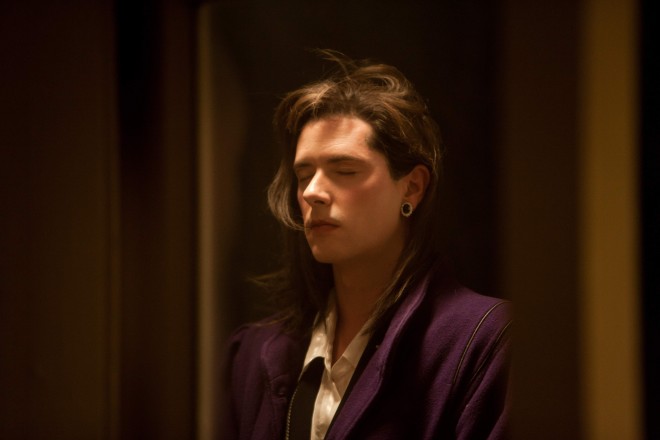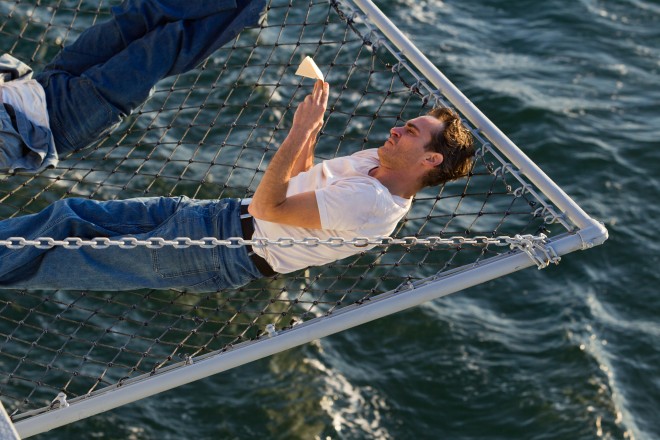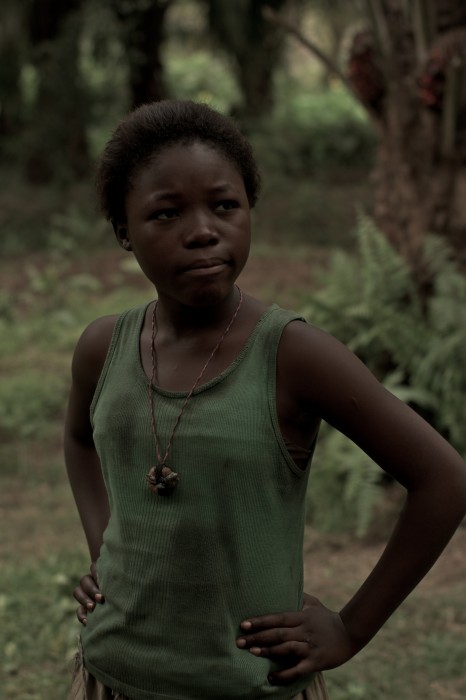When movies aren’t easy: ‘The Master,’ ‘Laurence Anyways,’ ‘Rebelle’
Paul Thomas Anderson’s opus is powered by the white-hot combustion of two actors at the top of their game
Share

Sometimes you want to close your eyes. Art is not always an easy ride, for one reason or another. In the aftermath of the Toronto International Film Festival, still feeling the retinal burn, we look around to see that suddenly it’s fall and three acclaimed films that lit up TIFF are now opening commercially—one American, two Canadian. Each comes with a challenge. The Master, starring Philip Seymour Hoffman as a cult leader and Joaquin Phoenix as his tormented acolyte, is close to two-and-a-half hours long. Powered by the white-hot combustion of two great actors at the top of their game, it more than earns its length, but many viewers will come out of the theatre shaking their heads, asking “WTF was that?” Laurence Anyways, the third feature from 23-year-old Quebec wunderkind, is a epic tale of a relationship between and man and a woman that is tested when the man decides become a woman. It’s almost three hours long, and pushes our patience with a dazzling virtuosity that ventures into the red zone of auteur indulgence. Rebelle, a more modest drama from a Quebec director, is the story of a pregnant teenage African girl who has been forced to shoot her parents, endure rape, and become a child soldier. Not exactly a date movie. But most of the atrocities occur off camera, as the child’s harrowing odyssey becomes a journey out of horror into innocence—it’s far more palatable than it sounds. Rebelle is Canada’s official Oscar entry for best foreign language film, and it’s a worthy candidate.
All three films are audacious and highly original: these are movies we haven’t seen before. Some thoughts . . .

The Master, perhaps the most hotly anticipated movie at TIFF, is Paul Thomas Anderson’s first feature in five years. With his previous film, There Will Be Blood, Daniel Day-Lewis won the Oscar for his portrayal of ruthless oilman carving an empire out of the ground at the dawn of the 20th century. The Master bears some resemblance to it. It’s another period epic about an American megalomaniac with a streak of Citizen Kane, but in this case he’s selling snake oil rather than fossil fuel. And while There Will Be Blood is a melodrama that steams along with locomotive linearity, The Master is a digressive cruise that messes with our heads—the same way Lancaster Dodd, the cult leader played by Philip Seymour Hoffman, plays mind games with his impressionable protegé, Freddie Quell, a Second World War veteran played by Joaquin Phoenix. Personally, I wasn’t as fond of There Will Be Blood as most critics. I found it hard to overcome my allergy to Day-Lewis’s monstrously showy performance. Not that there’s anything modest about the powerhouse performances delivered by Hoffman and Phoenix in The Master, who enact what amounts to a gladiatorial duel between the ego and the id respectively. But their work is utterly convincing and mannerism-free. And unlike Day-Lewis, who put on a virtual one-man show (pace Paul Dano), this film offers a rare example of two bravura performances joined at the hip. I don’t know how they’ll handle the Oscar nominations. Phoenix has a slightly larger part, and anchors the story’s point of view, but these are two lead performances that can’t be separated—which is why they shared the best actor prize at the Venice Film Festival.
The Master is a masterful character study. Phoenix plays a mentally unstable war vet who’s as dangerous and volatile as the homemade hootch that he spikes with gasoline. He’s seething with pent-up desire and unexplained frustration. Stuff happened during the war, and there’s girl who mattered somewhere in his past. After the war he becomes a portrait photographer in a department store, a job that ends badly when he flies into a rage and beats up a customer. Quell’s life changes in San Francisco when he wanders onto a ship bound for New York, a floating wedding party commanded by Dodd, whose daughter is getting married. The messianic founder of a movement that resembles Scientology, Dodd takes Quell under his wing, recognizing a human wreck that he can repair and make his own. He submits his recruit to a gruelling series of therapeutic interrogations, a ritual called “processing,” not unlike what Scientology calls “auditing.” Quell, the reckless skeptic, becomes an ardent acolyte, but he remains a loose cannon; there’s no telling what might set him off from one moment to the next. The two men develop a strange father-son bond laced with a homoerotic frisson. They’re not quite Oliver Reed and Alan Bates in Women in Love, but they do get on the ground and wrestle.
The Master is shaping up to be this year’s Tree of Life. Its story is far more straightforward and accessible, not to mention visceral, than the poetics of Terrence Malick. But like Malick’s epic, this is a movie that’s not afraid to baffle us. And it could have an equally polarizing effect, finding champions among film critics who embrace its double-black-diamond challenge, while leaving audiences scratching their heads. When I walked out of the theatre, I honestly didn’t know what to think. But the movie sits well in the imagination, burning on with a radioactive half-life. It’s mystery is the productive kind that pulls you back in. Like The Tree of Life, or Melancholia by Lars Von Trier, it’s a film I’m already dying to see again.
Laurence Anyways is a film I need to see again, though the prospect is less exciting. After screening it at Cannes last May, my memory of it has receded like a mirage, and couldn’t find three hours to spare during TIFF for a refresher course. This is what I remember: it’s full of brilliance, and could stand be a little less brilliant. With his third feature, Xavier Dolan has gone beyond proving he has talent to burn. Now he has to learn how to reign it in. After his semi-autobiographical tour de force, I Killed My Mother, and the impressionist watercolour of Heartbeats, with his third feature Dolan attacks a broader canvas with this sprawling portrait of a passionate relationship that runs into an impossible hurdle. What do you do when your boyfriend wants to become a woman? This is bold new ground for movie romance, something that Hollywood could turn into a godawful high-concept comedy. In Dolan’s hands, it makes for an intense yet credible drama, driven by a pair of superb performances.
A nuanced Melvil Poupaud plays Laurence, a university professor who gradually ventures out of the transsexual closet; a tempestuous Suzanne Clément co-stars as Fred, the love of his life, whose loyalty undergoes a test more daunting than mere infidelity. What has stuck with me, months after seeing the film, is that its tangential, looping narrative was more elaborate than necessary: it did not need to be so long. Most films that screen in competition in Cannes exceed two hours, so who can blame an aspiring young auteur for believing that anything less than that might disqualify him as a heavyweight contender. But it’s dangerous to make movies for festivals instead of audiences. When Dolan accepted the prize for best Canadian feature at TIFF, shaking with emotion, after apologizing to those who sat still for his film, he effusively thanked his producer and declared his love for her. But she would have done him, their movie and the audience a favour if she had not indulged his every desire. Before we vote our critics awards in December, I will give try to give Dolan the benefit of the doubt and see his movie a second time. But at this point I feel TIFF’s prize for best Canadian feature should have gone to Sarah Polley’s masterful docu-memoir Stories We Tell, or possibly Rebelle . . .

Rebelle (War Witch) is a powerful, compact, drama from another Montreal writer-director, Kim Nguyen, who spent a year bringing it to the screen. Komona (Rachel Mwanza) is a pregnant 14-year-old who tells her story to her unborn child in flashbacks, beginning with her abduction at age 12 by rebel forces, who invade her village and force her to kill her parents. Komona is put through a brutal boot camp in the jungle, trained as a child soldier, and intoxicated with a milky sap from a hallucinogenic plant. After her comrades are decimated in a battle with government troops, her miraculous survival convinces the rebel chief that Komona has powers of sorcery. Great Tiger (Mizinga Mwinga), the rebel leader, proclaims her his war witch. She, meanwhile, finds both an ally and a suitor in a fellow child soldier named Magician (Serge Kanyinda). Together they embark on a journey out of of the heart of darkness, and find some surprising moments of sweetness and light.
Nguyen shot the film entirely in the Democratic Republic of the Congo, where he captures both beauty and authenticity in a landscape that he populates with ghosts. The director discovered his star, Mwanza, in the streets, a raw talent who won best actress prizes at the Berlin and TriBeCa film festivals. She’s a quietly forceful and convincing presence.
Ngyuen says he shot the movie “as though only the present moment was real. My actors were not allowed to read the screenplay before the shoot, and we shot the film in sequence. In this way, the actors never knew what was going to happen to their characters the next day.”
Between the resolute performance of his young discovery and the verité mix of magic and realism, Rebelle has obvious parallels to Beasts of the Southern Wild, starring six-year-old dynamo Quvenzhané Wallis. It’s an extraordinary year when two girls with no acting experience—an African American from Louisiana and an African from the Congo—end up starring as resilient wilderness survivors in two underdog films backed by Oscar campaigns.